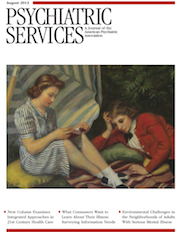What Do Outpatients With Schizophrenia and Mood Disorders Want to Learn About Their Illness?
Abstract
Objective
Psychiatric patients currently have access to a plethora of information about their illness. However, little systematic research has explored what psychiatric patients would like to learn about their illness. This study addressed the knowledge gap by asking outpatients with schizophrenia and mood disorders what they wished to learn about their illness and how they preferred to learn this information.
Methods
An exploratory survey of psychiatric outpatients was conducted between April 2011 and June 2012. A total of 202 outpatients with a diagnosis of either schizophrenia or related disorder (ICD-10 codes F20–F29) (N=106) or mood disorder (ICD-10 codes F30–F39) (N=96) were interviewed after routine meetings with their psychiatrist. Interviews were conducted with open- and closed-ended questions in outpatient clinics across East London, United Kingdom. Open-ended questions were analyzed qualitatively, and closed-ended questions were analyzed quantitatively.
Results
Over two-thirds of psychiatric outpatients (68%) reported that they would like to learn more about their illness. Overall, patients’ wishes for learning were heterogeneous. However, both diagnostic groups ranked “the cause of the illness” as their top information need. Most patients preferred to learn through one-to-one conversations with their psychiatrist (schizophrenia, 92%; mood disorder, 84%).
Conclusions
In regard to educating patients about their illness, there is no one-size-fits-all approach. Health care professionals need to be sensitive to individual learning preferences, which vary and can include group-based approaches. The results have implications for the training of psychiatrists. In particular, psychiatrists need to be equipped to address patients’ questions about the cause of the illness.



